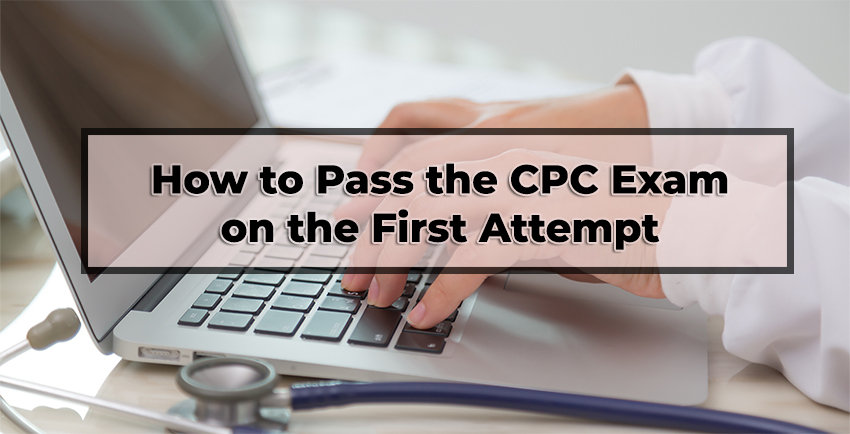How to Pass the CPC Exam on the First Attempt
Preparing for the Certified Professional Coder (CPC) exam can seem like a daunting task, but with the right strategies and dedication, you can pass it on the first attempt. The CPC exam, administered by the American Academy of Professional Coders (AAPC), is a rigorous assessment that evaluates your knowledge of medical coding, including the proper use of CPT, ICD-10, and HCPCS Level II codes. Below are some essential steps and tips to help you successfully pass the CPC exam on your first try.

1. Understand the CPC Exam Structure
Before diving into study materials, it’s crucial to understand the format of the CPC exam. The exam consists of 150 multiple-choice questions, covering various medical coding topics such as:
- 10,000-30,000 series of CPT codes
- ICD-10-CM guidelines
- HCPCS Level II codes
- Modifiers, Anatomy, and Medical Terminology
- Compliance, Regulatory Guidelines, and Reimbursement Methodologies
The exam allows for 5 hours and 40 minutes to complete, so time management is a critical factor.
2. Create a Study Plan
A well-structured study plan is one of the most important aspects of preparing for the CPC exam. Breaking your study sessions into manageable chunks will help prevent burnout and ensure consistent progress. Focus on these areas:
- CPT Coding: Study the CPT codebook thoroughly, especially the 10,000-30,000 series, which cover surgeries and procedures.
- ICD-10-CM Coding: Understand the rules for diagnosis coding, focusing on guidelines and conventions.
- HCPCS Codes: Familiarize yourself with the Level II codes used for services, equipment, and supplies not covered by the CPT codes.
Make sure to allocate specific times each day to cover these topics, along with reviewing anatomy and medical terminology.
3. Use CPC Study Guides and Practice Exams
There are several study guides, practice exams, and CPC review books available, designed to mimic the actual exam. Practice exams are an invaluable tool because they:
- Help you get accustomed to the type and difficulty level of questions you’ll encounter.
- Teach you time management, enabling you to pace yourself during the exam.
- Identify your weak areas, giving you the opportunity to focus on improving them.
Regularly testing yourself with these exams will increase your confidence and competence, ensuring you're fully prepared on the day of the actual test.
4. Focus on Time Management
Time management is one of the most challenging aspects of the CPC exam. With 150 questions and under six hours to complete the exam, you’ll have approximately 2 minutes per question. Practice pacing yourself during mock exams, and use time-saving strategies, such as:
- Skipping Difficult Questions: If a question seems too complicated, skip it and come back to it later. Avoid wasting too much time on one question.
- Marking Questions for Review: Use the provided system to mark questions you’re unsure of so you can quickly find them for review before submitting your exam.
5. Master Medical Terminology and Anatomy
A solid understanding of medical terminology and anatomy is vital for passing the CPC exam. Knowing the location of body parts, medical terms, and procedures will help you in choosing the correct codes. Brush up on:
- Musculoskeletal system
- Cardiovascular system
- Respiratory system
- Digestive system
- Neurological and reproductive systems
The better your understanding of these areas, the faster you’ll be able to accurately match procedures and diagnoses to codes.
6. Stay Updated on Coding Guidelines
The CPC exam requires you to stay up-to-date with the latest coding guidelines, as they can change annually. Ensure you're familiar with:
- ICD-10-CM Official Guidelines: Review these regularly, as they outline important rules and guidelines for coding various conditions.
- CPT Codebook Updates: Be aware of new, revised, or deleted codes in the current year's CPT manual.
- HCPCS Level II Codes: Ensure you understand the latest updates and how to apply them properly.
7. Attend CPC Exam Prep Courses or Workshops
If possible, attend a CPC exam preparation course. These are typically offered by the AAPC and other accredited organizations. These workshops often cover all the key areas tested on the exam, and you’ll benefit from guidance by certified instructors who understand the exam structure and content inside out.
8. Utilize Online Forums and Study Groups
Studying in a group or participating in online medical coding forums can provide valuable insights and tips from others who have taken the exam. Engaging with others who share the same goal helps you stay motivated and provides an opportunity to ask questions about concepts or problems you're struggling with.
9. Get a Good Night’s Sleep Before the Exam
The day before your exam, avoid heavy studying. Instead, review your notes, relax, and focus on getting a good night’s sleep. Being well-rested ensures that you're mentally sharp during the exam, which is critical for answering questions quickly and accurately.
10. What to Bring to the Exam
Ensure that you bring everything you need to the testing center, such as:
- AAPC-approved CPT, ICD-10-CM, and HCPCS Level II code books.
- Two forms of identification.
- #2 pencils and an eraser.
- A timing device, as long as it doesn’t make noise or disrupt others.
Double-check the AAPC’s list of what is allowed and required during the exam.
11. Stay Calm and Confident
Lastly, stay calm and confident. You’ve put in the time, effort, and dedication required to succeed. Trust your preparation and instincts as you move through the exam.
By following these steps, you can confidently pass the CPC exam on your first attempt. Remember, thorough preparation, time management, and practice are the keys to success. Becoming a Certified Professional Coder opens many doors in the healthcare industry, so your investment of time and effort will pay off significantly.

